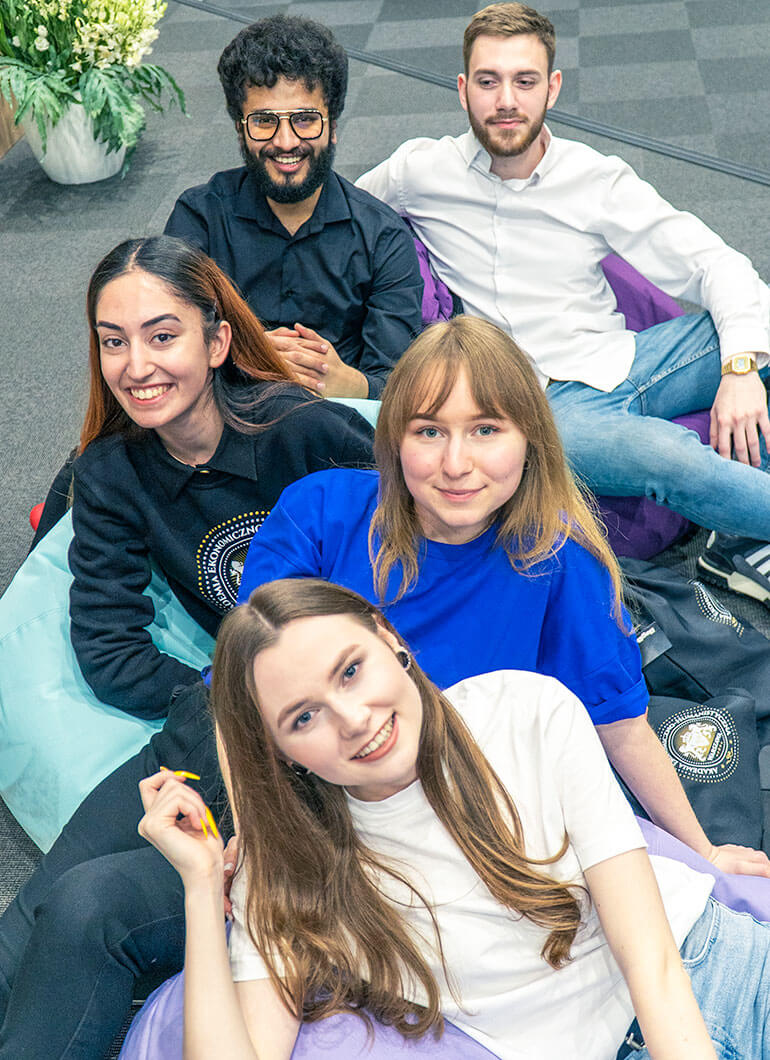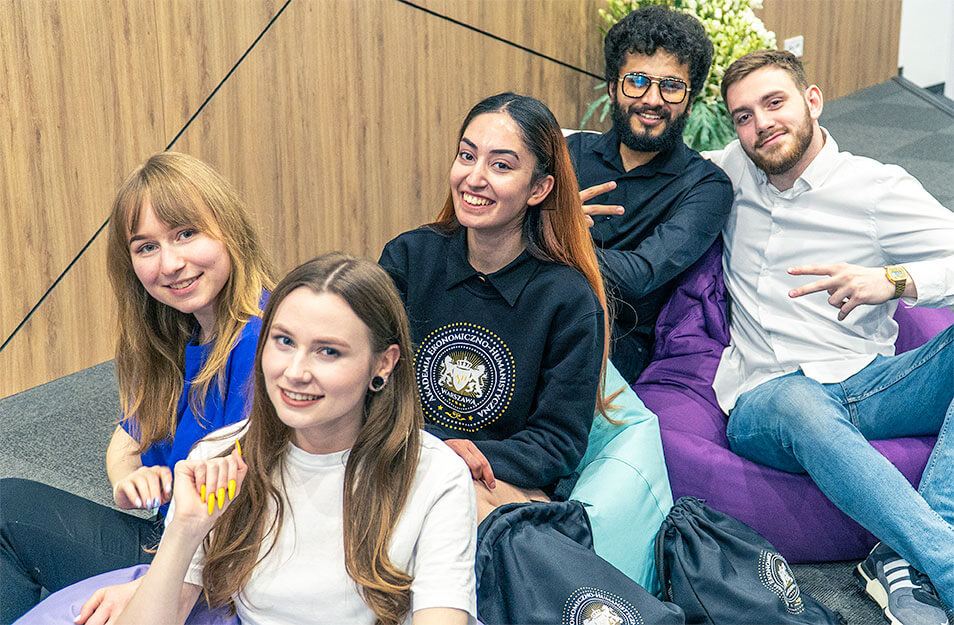Chillout Studies
Undergraduate (Bachelor)
Chillout Studies
Why choose this field of study?
The fast pace of life, competition, the ever-increasing number of roles and challenges we want to meet, the flurry of stimuli caused by the technological revolution – all of this has made living under chronic stress second nature to modern man. Permanent tension adversely affects physical and mental health, which is why more and more people are seeking professional help from experts in the field of positive psychology, which focuses on the scientific basis of feelings of happiness, well-being and relaxation. If you want to become one of them and thus gain a profession of the future – choose to study the innovative Chillout Studies course at the VIZJA University.
During your studies, you will gain fascinating knowledge in the fields of psychology, neuropsychology and cognitive science, studying cognitive processes, psychophysical reactions, as well as external factors and sensory experiences that influence the perception of stress or a relaxed state. The programme also covers social psychology, with a focus on stress management in the workplace, motivating employees or implementing work-life balance. Practical classes are the key to understanding theory, which is why trainings, workshops and laboratories are an integral part of the studies, e.g. in the areas of interpersonal skills, coping with stress symptoms, neurofeedback (brain training) and creating relaxation spaces.
Chillout Studies, undergraduate studies – what sets us apart?
- This is an innovative and unique course of study on a national scale, the completion of which will allow you to stand out on the job and service market – especially in the fields of personal and business coaching, HR or psychoeducation.
- You will gain scientific knowledge and at the same time a variety of tools to implement this in your professional practice as well as in your everyday life.
- You develop knowledge and competences in positive psychology, which is growing rapidly and gaining popularity all over the world.
- In your diploma year you will carry out your own social project on a topic of your choice from the field of Chillout Studies.
- You will expand your knowledge and acquire skills under the guidance of prominent VIZJA University lecturers, experts and practitioners.
- With us you study in an international atmosphere and a friendly, open academic environment (we are among the top universities awarded in the Perspektywy 2023 ranking in the Internationalisation category).
Chillout Studies – what can you do after graduation?

Completing a degree in Chillout Studies at AEH will allow you to thrive in modern professions that have recently emerged and will continue to emerge in response to the needs of individuals and businesses, particularly corporate clients. You can find employment in large organisations or run your own business as a wellbeing coach, wellbeing manager, wellbeing coach or wellbeing consultant. You can also earn money as a lifestyle influencer on social media or run your own business based on running relaxation workshops or arranging relaxation spaces – such as chillout rooms in offices. Or maybe you want to develop yourself as a researcher of stress prevention methods and techniques? It all depends on you!
This program
is for you if:
You are looking for an out-of-the-box, cutting-edge psychology degree course that will give you a unique education and interesting career prospects.
You are interested in the phenomenon of stress, relaxation methods and the impact of the environment on human well-being.
You want to professionally help people improve their quality of life – and thus gain the profession of the future!



Admission rules and regulations
Note: important information for 2025 candidates
Please read carefully the application procedures in line with the changes introduced by the Polish Ministry of Science and Higher Education in 2025.
Programme and structure of studies
UNDERGRADUATE STUDIES
(BACHELOR’S DEGREE)
The bachelor’s degree programme in Chillout Studies at VIZJA University is based on the training of students in the field of psychology – mainly cognitive and social psychology – with a particular emphasis on the psychology of stress. An integral part of the degree programme are numerous practical classes taught by experts from different areas of specialised knowledge.
FIRST YEAR OF STUDY
In the first year, the student learns about general and directional subjects that introduce further topics developed in the course of study. He or she also participates in workshops and trainings, learning in practice methods for dealing with stress, techniques for measuring brain activity or principles of designing a relaxation space.
SEMESTER I
| Subject name | Cummulative amount of ECTS points | Cummulative amount of hours (FT/PT) |
|---|---|---|
| Health and Safety | 0 | 8/8 |
| Academic skills | 1 | 15/8 |
| Introduction to Philosophy / Anthropology (Elective) | 5 | 35/20 |
| Fundamentals of social communication | 4 | 30/16 |
| Aesthetics | 5 | 30/16 |
| Basic economics / Organisation and management theory (Elective) | 5 | 30/24 |
| Introduction to psychology | 5 | 30/24 |
| Stress management training | 2 | 30/16 |
| Work-life balance | 3 | 30/16 |
SEMESTER II
| Subject name | Cummulative amount of ECTS points | Cummulative amount of hours (FT/PT) |
|---|---|---|
| Foreign language (I) | 2 | 30/16 |
| Sports and Recreation | 0 | 30/0 |
| Biological basis of behaviour | 3 | 30/24 |
| Cognitive processes | 5 | 60/40 |
| Emotions and motivation | 5 | 60/40 |
| Neuropsychology | 4 | 30/24 |
| Positive psychology and sociology of happiness | 4 | 60/32 |
| Biofeedback and neurofeedback | 3 | 30/16 |
| Introduction to design - light and colour | 4 | 45/24 |
SECOND YEAR OF STUDY
The third and fourth semesters of the degree programme include further study topics such as work psychology and wellbeing, as well as interesting practical classes, e.g. in rest ergonomics or music therapy.
SEMESTER III
| Subject name | Cummulative amount of ECTS points | Cummulative amount of hours (FT/PT) |
|---|---|---|
| Foreign language (II) | 2 | 30/16 |
| Sports and Recreation | 0 | 30/0 |
| Interpersonal skills training | 2 | 30/16 |
| Personality psychology | 4 | 30/24 |
| Social psychology | 5 | 60/40 |
| Introduction to labour psychology | 3 | 30/24 |
| Psychology of stress | 3 | 30/16 |
| Neuroscience of cognitive processes | 3 | 30/16 |
| Introduction to quality of life research | 3 | 30/16 |
| Architecture and design of relaxation spaces | 5 | 60/32 |
SEMESTER IV
| Subject name | Cummulative amount of ECTS points | Cummulative amount of hours (FT/PT) |
|---|---|---|
| Foreign language (III) | 2 | 30/16 |
| Introduction to coaching | 4 | 30/16 |
| Motivation, remuneration and appraisal systems of employees | 4 | 60/40 |
| Labour and social security law | 2 | 30/16 |
| Ergonomics of rest | 3 | 30/16 |
| Health education | 3 | 30/16 |
| Auditory psychology and music therapy | 3 | 45/24 |
| Development of eating habits and behaviours | 3 | 30/16 |
| Selected issues in pedagogy - Developmental education | 3 | 30/16 |
| Psychophysiology of sleep | 3 | 45/24 |
THIRD YEAR OF STUDY
In the third year, students supplement their knowledge with further directional topics – including elective subjects. They also complete a work placement, their own social project and a diploma exam.
SEMESTER V
| Subject name | Cummulative amount of ECTS points | Cummulative amount of hours (FT/PT) |
|---|---|---|
| Foreign language (IV) | 3 | 30/16 |
| Philosophy of happiness | 2 | 30/16 |
| Psychology of smell and olfactory memory | 3 | 30/16 |
| Stress management in the workplace | 3 | 30/16 |
| Psychoprevention and psychoeducation | 2 | 30/16 |
| Ethics of working with clients | 2 | 30/16 |
| Methodology of project preparation | 3 | 30/16 |
| Internship (I) | 12 | 360/360 |
SEMESTER VI
| Subject name | Cummulative amount of ECTS points | Cummulative amount of hours (FT/PT) |
|---|---|---|
| Psychology of creativity / Psychology of sport (Elective) | 4 | 30/16 |
| Psychology of video games / Superfoods (Elective) | 2 | 30/16 |
| Design thinking / Ecological lifestyle (Elective) | 2 | 30/16 |
| Visual arts and leisure / Applied art design (Elective) | 2 | 30/24 |
| Body and breath work techniques | 3 | 30/16 |
| Social project | 5 | 60/32 |
| Internship (II) | 12 | 360/360 |
The content of the study program may change as a result of efforts to improve the quality of education and adapt the teaching offer to the current challenges of the labor market. Each change is approved by the University Senate and introduced with the aim of preparing students for their future careers in the best possible way.
Tuition fees
Fixed tuition - flexible payments
By choosing to study at VIZJA University, you can be sure that the tuition fee will not change throughout the duration of your studies. You can pay the tuition fee once for the entire year of study or spread over a semester payment. This allows you to decide how you want to plan your expenses.

Fees (academic year 2025/2026)
EU&OTHER COUNTRIES GROUP
| Year of study | Annually | Per semester* |
|---|---|---|
| I | 2900 € | 1600 € |
| II | 2900 € | 1600 € |
| III | 2900 € | 1600 € |
*Semester payment is possible from the second year of studies.
OTHER COUNTRIES
| Year of study | Annually | Per semester* |
|---|---|---|
| I | 3900 € | 2100 € |
| II | 3900 € | 2100 € |
| III | 3900 € | 2100 € |
*Semester payment is possible from the second year of studies.
EU and other countries group
This group includes citizens of the countries member states of the European Union and the following countries citizens: Azerbaijan, Belarus, Bosnia and Herzegovina, Montenegro, Georgia, Kazakhstan, Kosovo, Kyrgyzstan, Latin America, Macedonia, Moldova, Norway, Russia, Serbia, Tajikistan, Turkey, Turkmenistan, Ukraine, Uzbekistan.
Other countries
The citizens of all the remaining countries.
Study in Polish!
Do you want to study at VIZJA University in Polish? It is possible! We have prepared a special program for international students to acquire the skills necessary for active study in Polish and for academic, social and everyday life in Poland.
The Comprehensive Polish Language Program for International Students is:
- part of The VIZJA University Foundation Program, which is a comprehensive preparation for starting regular Bachelor's or Master's studies in Polish at VIZJA University
- a course aimed at two groups of international students: students with knowledge of a Slavic language (Russian, Ukrainian, Czech etc.) and students without prior knowledge of any Slavic language
- a chance for immersion in Polish society and culture, authentic experience of life in Poland and broad career prospects on the Polish labour market
More details coming soon!
Scholarships - easier than you think

While studying at VIZJA University, you can take advantage of a wide range of financial support from the state budget and European funds, as well as benefit from special discounts with VIZJA University discount program
You can submit most scholarship applications quickly and easily through your online account.
In the academic year 2023/2024, VIZJA University awarded 800 Rector’s Scholarships, ranging from PLN 400 /month to PLN 1000 /month, depending on the average or achievements. For outstanding sport, artistic or scientific achievements, the Scholarship Committee awarded scholarships of PLN 600 /month.
Detailed information on the possibility of applying for the Rector’s Scholarship is available in the dean’s system.
A sports scholarship may be awarded to a student who excels in sport achievements at least national level. In addition we also encourage our students to take part in additional support programs- eg. the National Academic Representation.
Young sportsmen can count on financial support in the amount of PLN 600 /month.
Detailed information on the possibility of applying for sports scholarship is available in the dean’s system.
A scholarship for people with disabilities may be awarded to a student who has a disability certificate, a disability degree certificate, a ZUS certifying physician’s certificate, a disability group certificate or a certificate of permanent or long-term incapacity to work on a farm.
In the 2023/2024 academic year, depending on the degree of disability, 350 scholarships for people with disabilities were awarded, ranging from PLN 1700 /month to PLN 1900 /month.
Detailed information on the possibility of applying for a scholarship for people with disabilities is available in the dean’s system.
The allowance is a form of emergency financial assistance. Any student who found himself temporarily in a difficult life situation resulting from random events beyond the student’s control can apply for it.The allowance may be granted twice in one academic year, and the allowance is not granted twice for the same random event.
In 2024, we granted 51 allowances for a total of PLN 255 000. The allowances, depending on the student’s situation, were paid in the amount of PLN 2,000 to PLN 5,000 at a time.
Detailed information on the possibility of applying for the allowance is available in the dean’s system.
2023/2024 academic year
800 Rector’s Scholarships
51 allowances
350 scholarships for people with disabilities
12 500 000 PLN was spent in 2023/2024 on scholarships
PLN 1,890,289.35 was spent in 2019/2020 on scholarships
PLN 2,911,662.50 was spent in 2020/2021 on scholarships
PLN 4,158,177.00 was spent in 2021/2022 on scholarships
PLN 7,829,950.00 was spent in 2022/2023 on scholarships
Rector’s Scholarship – highest average: 5,44





